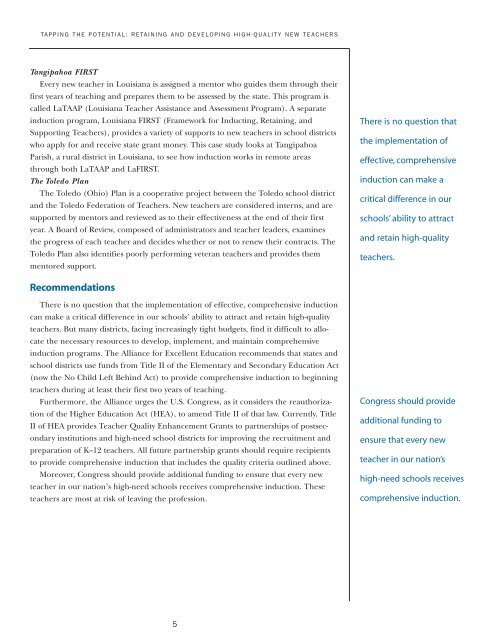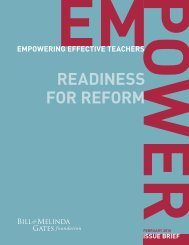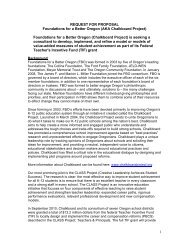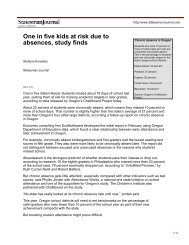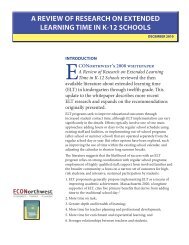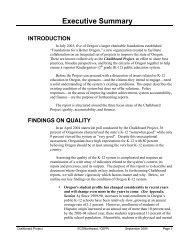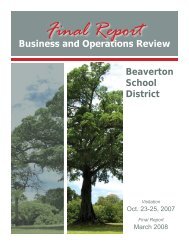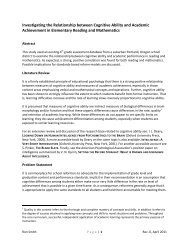Tapping the Potential - Alliance for Excellent Education
Tapping the Potential - Alliance for Excellent Education
Tapping the Potential - Alliance for Excellent Education
Create successful ePaper yourself
Turn your PDF publications into a flip-book with our unique Google optimized e-Paper software.
TA P P I N G T H E P O T E N T I A L : R E TA I N I N G A N D D E V E L O P I N G H I G H - Q U A L I T Y N E W T E A C H E R STangipahoa FIRSTEvery new teacher in Louisiana is assigned a mentor who guides <strong>the</strong>m through <strong>the</strong>irfirst years of teaching and prepares <strong>the</strong>m to be assessed by <strong>the</strong> state. This program iscalled LaTAAP (Louisiana Teacher Assistance and Assessment Program). A separateinduction program, Louisiana FIRST (Framework <strong>for</strong> Inducting, Retaining, andSupporting Teachers), provides a variety of supports to new teachers in school districtswho apply <strong>for</strong> and receive state grant money. This case study looks at TangipahoaParish, a rural district in Louisiana, to see how induction works in remote areasthrough both LaTAAP and LaFIRST.The Toledo PlanThe Toledo (Ohio) Plan is a cooperative project between <strong>the</strong> Toledo school districtand <strong>the</strong> Toledo Federation of Teachers. New teachers are considered interns, and aresupported by mentors and reviewed as to <strong>the</strong>ir effectiveness at <strong>the</strong> end of <strong>the</strong>ir firstyear. A Board of Review, composed of administrators and teacher leaders, examines<strong>the</strong> progress of each teacher and decides whe<strong>the</strong>r or not to renew <strong>the</strong>ir contracts. TheToledo Plan also identifies poorly per<strong>for</strong>ming veteran teachers and provides <strong>the</strong>mmentored support.There is no question that<strong>the</strong> implementation ofeffective, comprehensiveinduction can make acritical difference in ourschools’ ability to attractand retain high-qualityteachers.RecommendationsThere is no question that <strong>the</strong> implementation of effective, comprehensive inductioncan make a critical difference in our schools’ ability to attract and retain high-qualityteachers. But many districts, facing increasingly tight budgets, find it difficult to allocate<strong>the</strong> necessary resources to develop, implement, and maintain comprehensiveinduction programs. The <strong>Alliance</strong> <strong>for</strong> <strong>Excellent</strong> <strong>Education</strong> recommends that states andschool districts use funds from Title II of <strong>the</strong> Elementary and Secondary <strong>Education</strong> Act(now <strong>the</strong> No Child Left Behind Act) to provide comprehensive induction to beginningteachers during at least <strong>the</strong>ir first two years of teaching.Fur<strong>the</strong>rmore, <strong>the</strong> <strong>Alliance</strong> urges <strong>the</strong> U.S. Congress, as it considers <strong>the</strong> reauthorizationof <strong>the</strong> Higher <strong>Education</strong> Act (HEA), to amend Title II of that law. Currently, TitleII of HEA provides Teacher Quality Enhancement Grants to partnerships of postsecondaryinstitutions and high-need school districts <strong>for</strong> improving <strong>the</strong> recruitment andpreparation of K–12 teachers. All future partnership grants should require recipientsto provide comprehensive induction that includes <strong>the</strong> quality criteria outlined above.Moreover, Congress should provide additional funding to ensure that every newteacher in our nation’s high-need schools receives comprehensive induction. Theseteachers are most at risk of leaving <strong>the</strong> profession.Congress should provideadditional funding toensure that every newteacher in our nation’shigh-need schools receivescomprehensive induction.5


